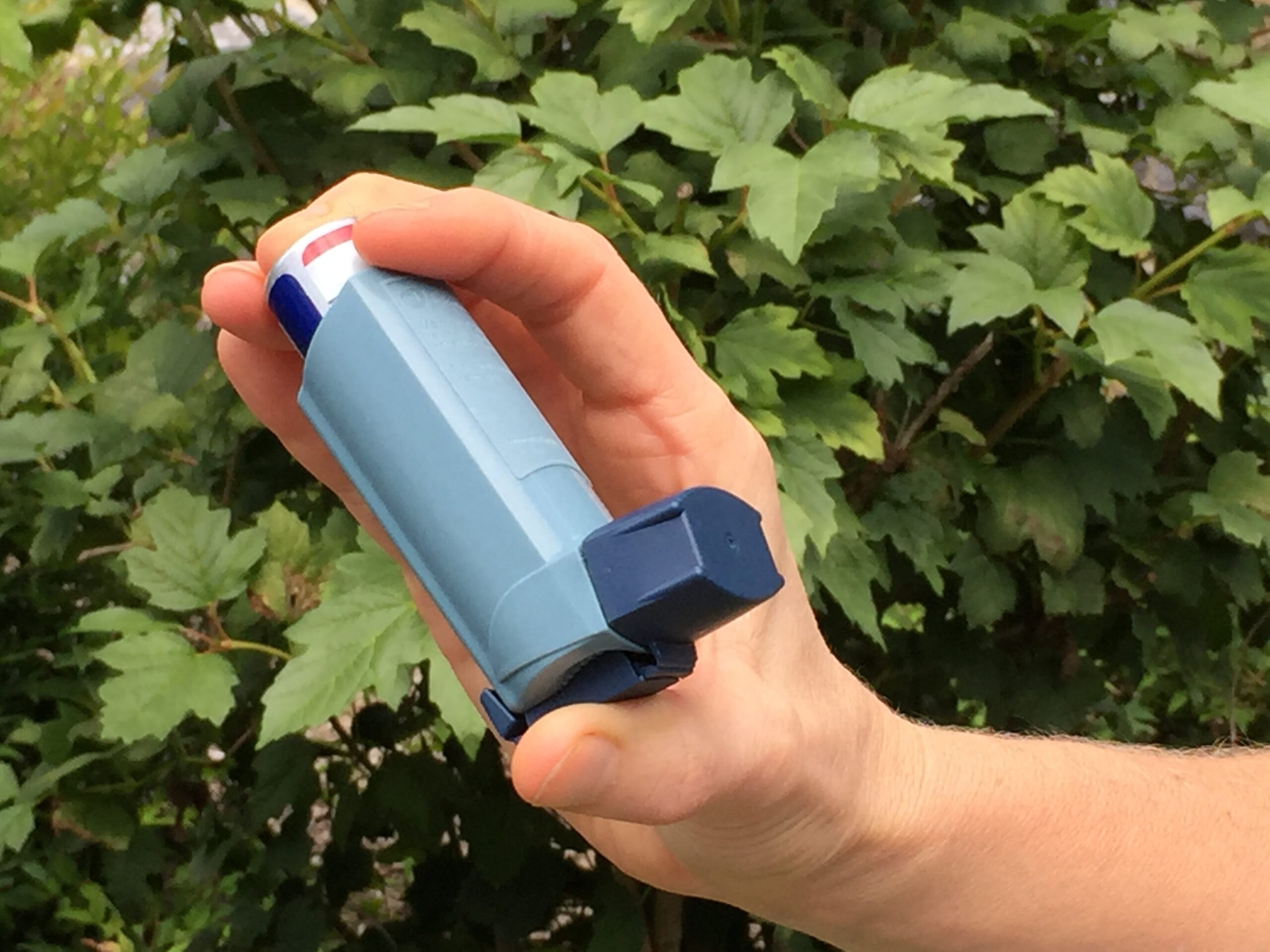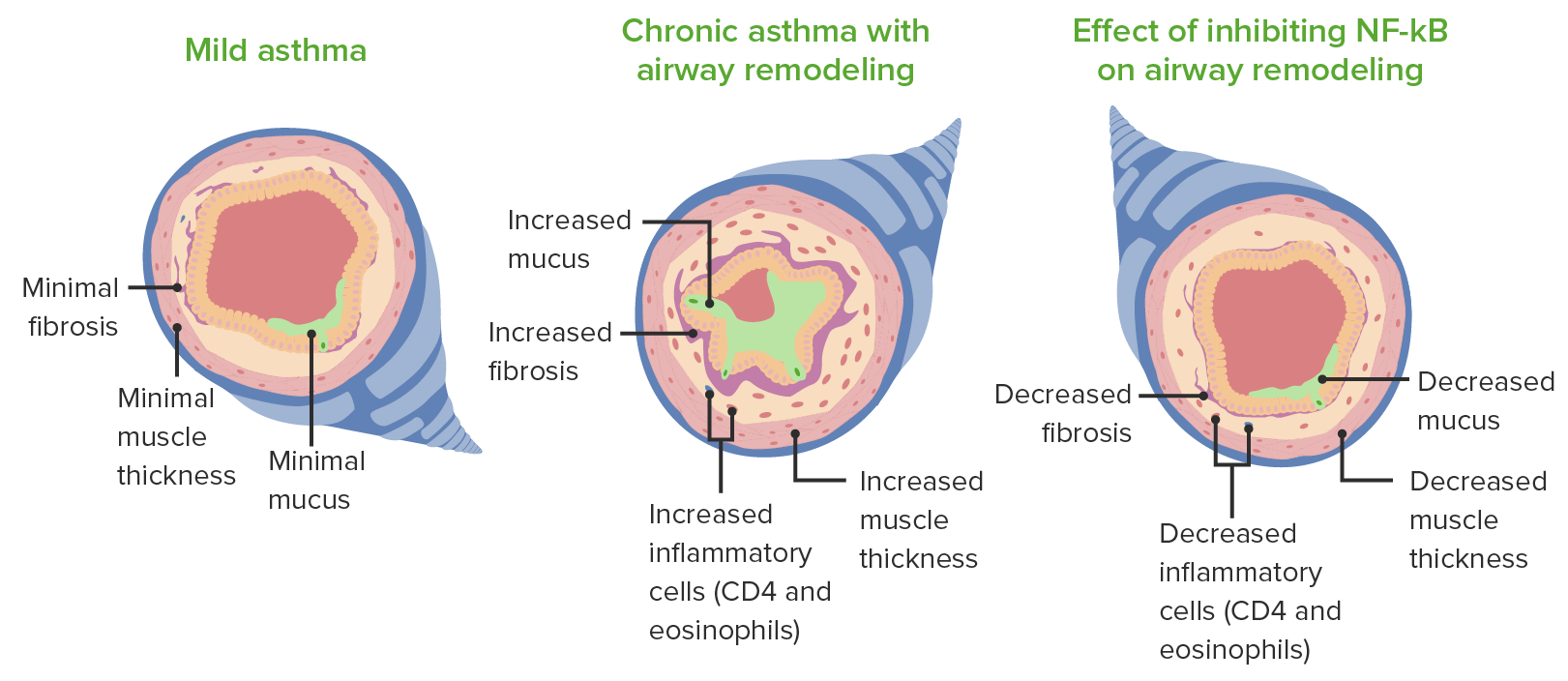Playlist
Show Playlist
Hide Playlist
Pediatric Asthma: Management
00:01 So when we send them home, we want them not to come back again. 00:07 And the way we’re going to prevent them from coming back again is by maintaining a better control of their asthma than they’ve had before. 00:15 To decide about control, we first have to decide what type of asthma they have. 00:21 Let’s talk about the different categories of asthma. 00:25 Intermittent asthma is sometimes called mild intermittent asthma. 00:31 That’s where you have exacerbations now and then, but it’s by no means a regular condition. 00:36 Then you have mild persistent, moderate persistent, and severe persistent. 00:42 These children have more and more frequent exacerbations and we’ll through what that means. 00:49 But one key thing to remember is asthma in the United States is getting more common and more severe. 00:58 Deaths in asthma are at an increased rate now than ever before. 01:03 Children in the intermittent category of asthma are likely to die just like any other category. 01:11 So categorizing them as intermittent doesn’t mean you no longer pay attention to their asthma, it means they need less control or medication, and that’s why we’re determining their category. 01:24 How do we determine it? We ask these questions. 01:26 Are you having night time awakenings? How frequently do you use albuterol? How much does your asthma interfere with your normal activity? And how often have you used systemic steroids in this past year? Now, you’re going to take this information and you’re going to then categorize them into one of these categories. 01:50 These are all outlined in the National Heart, Lung, and Blood Institute guidelines, but I’ll summarize them here for you. 01:58 So if you are an intermittent asthmatic, you should have symptoms less than two days a week, you should wake up less than two nights per month, you should have used albuterol less than two days per week, you should have no interference with your daily activities, and you should only be on steroids once a year. 02:18 If you have mild persistent disease, these numbers go up, where your symptoms are two to six days a week, your awakenings are three to four nights a month, and your albuterol use is two to six days a week, and you have minor interference and that’s a subjective call. 02:33 Moderate persistent, likewise, it goes up. 02:36 Now you’re having daily symptoms, you’re awakening frequently, you’re needing albuterol every day, it’s very much interfering with your life, and you’re using steroids more than two times a year. 02:48 If any of these things are true, you’re now a moderate persistent asthmatic. 02:51 And now we get to severe persistent and these patients are very sick with daily symptoms all day long, every night they’re waking up, these patients have extreme problems with getting through their day. 03:04 Now, we’re going to use this category to decide what kind of inhalational therapy they’re going to get as a controller. 03:12 When we choose a controller, if they are intermittent and between five and eleven years old, they’re just going to use the albuterol. 03:19 They don’t require a controller. 03:21 If they’re mild persistent, they’ll get two puffs twice a day of a low dose steroid. 03:27 There are some inhaled steroid formulations that are once a day, but most are twice a day, and you have to make sure they’re getting it the right amount. 03:35 Moderate persistent, they’re going to give a higher dose steroid and the example I show here is fluticasone 110 micrograms per puff twice a day. 03:44 And then if they’re severe, you may add multiple medications. 03:47 This patient is getting both fluticasone and oral montelukast, which is a leukotriene inhibitor. 03:54 If they’re older, we may be a little bit more aggressive. 03:58 Once we hit that severe persistent range, now we’re really talking about using combination therapy of both long-acting beta-agonists or LABAs with a steroid. 04:11 Long-acting beta-agonists alone without the steroid are contraindicated. 04:16 There’s a black box warning and it may be associated with death in asthma. 04:20 The data aren’t very good. 04:22 But the point is in the United States, because of that black box warning, all LABAs or long-acting beta-agonists, in this case salmeterol, are combined with a steroid, in this case fluticasone. 04:36 This drug is known as Advair on the market. 04:38 There are lots of drugs out there. 04:40 It doesn’t matter which kind you choose, it’s simply getting the right category and getting the right treatment for the severity of that child’s illness. 04:50 So let’s say a patient is on a controller and they’ve now come in with an asthma exacerbation. 04:57 How do you figure out what the right thing to do is? They’re already on a controller, it may be that their asthma is worse, so the first question you ask is, is the child taking the controller appropriately? The reality is the vast majority of the time, the answer is going to be no. 05:15 Either that family is noncompliant and is forgetting doses, the child often, especially in the early adolescent years, will stop taking their controller because they just don’t want to. 05:25 Another possibility is they’ve got the technique wrong. 05:27 Remember, the best technique for one of these inhalers that are meter-dosed inhalers is to use a spacer and in little children a mask and a spacer. 05:36 Taking it without the spacer, it doesn’t work. 05:39 They’re just swallowing the medication. 05:41 For the discus ones with the powder, sometimes it requires a little bit more coordination and a child simply isn’t old enough to figure it out. 05:50 So if the child is not taking the controller appropriately, then, really, the best thing to do is to do more education, to educate this child into how to use the spacer correctly or to change around what you’re using that’s more age appropriate. 06:07 If the child is using it appropriately, this is when you really want to step up your controller medication and there’s a lot of different ways you can do that step-up therapy. 06:17 So, for example, if a patient has a lot of allergic sequelae, they may benefit a little bit more from getting a leukotriene inhibitor added as opposed to stepping up the strength of their inhaled steroid. 06:30 Whatever the case may be, understanding control of asthma and prevention of asthma is what’s incredibly important to preventing death and preventing long-term sequelae from a patient with asthma. 06:43 Thanks.
About the Lecture
The lecture Pediatric Asthma: Management by Brian Alverson, MD is from the course Pediatric Pulmonology. It contains the following chapters:
- Pediatric Asthma: Preventing Exacerbations
- Pediatric Asthma: Management
Included Quiz Questions
A 7 year old uses albuterol three times a week and has night-time coughing that wakes him up twice a week. He takes his low-dose fluticasone, two puffs twice a day and is compliant. What’s the best thing to do?
- Add moderate dose fluticasone
- Give him more albuterol and use it more frequently
- Put him on a long-acting beta-agonist twice daily as monotherapy
- Admit him to the hospital for pulmonary function tests
A patient is admitted to the hospital with an asthma exacerbation. What medicine is most likely to prevent him from bouncing back to the hospital?
- Steroids
- Albuterol
- Magnesium
- Terbutaline
All of the following questions are relevant to ask a patient with asthma, EXCEPT?
- Associated constipation?
- Intereference with daily activities?
- Frequency of use of albuterol?
- Systemic steroid use in this year?
- Nighttime awakening?
Which of the following answers for frequency of nighttime awakenings would be categorized as "intermittent asthma
- Once a month.
- 4 times a month.
- Once a week.
- Twice a week.
- Every other night.
Customer reviews
5,0 of 5 stars
| 5 Stars |
|
1 |
| 4 Stars |
|
0 |
| 3 Stars |
|
0 |
| 2 Stars |
|
0 |
| 1 Star |
|
0 |
Such a helpful presentation.The most important points of Asthma diagnosis and management in minutes. sure I recommended to my colleges. Thank you,doctor.





